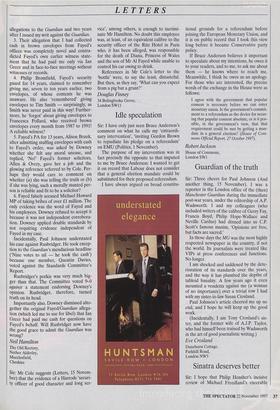Idle speculation
Sir: I have only just seen Bruce Anderson's comment on what he calls my 'extraordi- nary intervention', 'inviting Gordon Brown to repudiate his pledge on a referendum' on EMU (Politics, 1 November).
The purpose of my intervention was in fact precisely the opposite to that imputed to me by Bruce Anderson: I wanted to get it on record that Labour does not consider that a general election mandate could be substituted for their proposed referendum.
I have always argued on broad constitu- tional grounds for a referendum before joining the European Monetary Union, and it is on public record that I took this view long before it became Conservative party policy.
If Bruce Anderson believes it important to speculate about my intentions, he owes it to your readers, and to me, to ask me about them — he knows where to reach me. Meanwhile, I think he owes us an apology. For those who are interested, the precise words of the exchange in the House were as follows: I agree with the government that popular consent is necessary before we can enter monetary union. Is the government's commit- ment to a referendum as the device for secur- ing that popular consent absolute; or is it pos- sible, in the government's view, that that requirement could be met by getting a man- date in a general election? (House of Com- mons Official Report, 27 October 1997).
Robert Jackson House of Commons, London SW1


















































































 Previous page
Previous page